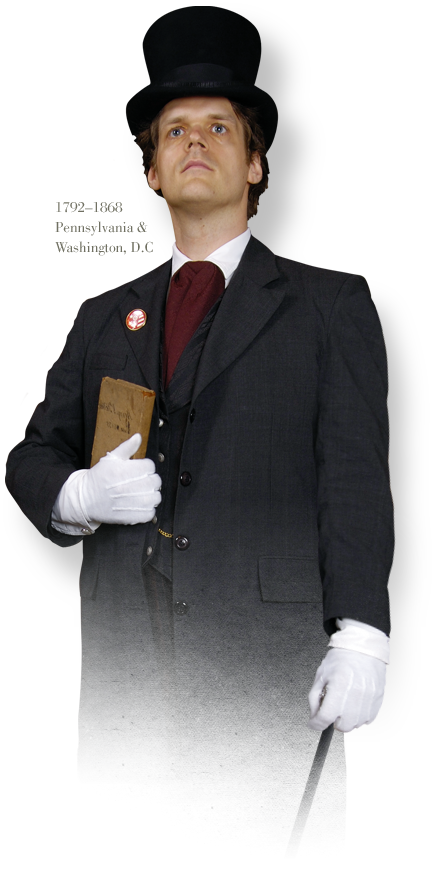Thaddeus Stevens
His Story
Avid abolitionist and one of Lancaster’s most prominent citizens, Thaddeus Stevens was born in Danville, Vermont. Thaddeus Stevens completed his studies at Dartmouth in 1814. Following graduation, Stevens moved to York, Pennsylvania, where he began preparation for a career as an attorney. He started a practice in Gettysburg and quickly gained a reputation as a good and dogged attorney that often defended freedom seekers. Stevens became involved in iron works at this point in his life as well.
Following the establishment of his practice, Stevens ran for office and won a seat in the Pennsylvania House of Representatives on the Anti-Masonic ticket. Stevens became one of the primary advocates for the establishment of public education in Pennsylvania. In 1842, with his political career on the rise, Stevens moved to Lancaster, PA where he established his office and employed Lydia Hamilton Smith, an African-American woman, to care for the building. In addition to tending the residence, evidence suggests that both she and Stevens were conductors in the Underground Railroad and used the building and its grounds to harbor freedom seekers on the Southeastern network trail connecting Gettysburg to Chester via Lancaster and Columbia.
A leading member of Congress during and after the Civil War, Stevens became a loud voice that urged the United States to contain and abolish slavery. Upon the creation of the Republican party, Stevens left the Whigs and became a very powerful member of this Party. He served in the U.S. House of Representatives. By the time the Civil War started, Stevens had been an attorney for fifty years, as well as a state representative in Harrisburg. He became a vociferous opponent of the Confederacy. He sought no concessions with the Confederate states. Furthermore, Stevens chaired the powerful Ways and Means Committee in the House. In June 1863, when Confederates invaded Pennsylvania in the campaign that culminated in defeat at Gettysburg, some Confederates sought out Stevens’ property and destroyed his extensive iron works that consisted of a large charcoal furnace, forge, rolling mill, coal house and shops. Despite this loss of approximately $50,000 worth of property, Stevens continued in “his unblushing devotion to freedom.”
Following the War, Stevens chaired the House’s section of the powerful Joint Congressional Committee on Reconstruction. In this capacity, Stevens rejected President Andrew Johnson’s conciliatory initiatives and instead supported reconstruction enforced by the military. His legacy is the 13th, 14th and 15th amendments, which legally ended slavery, promise equality under the law, and serve as the basis for all civil rights legislation respectively.
Thaddeus Stevens died in his home/office in Lancaster on August 11, 1868. Throughout his career, Stevens provided legal assistance to abolitionist causes, defending freedom seekers in court, as well as the rights of women and other minorities. Stevens also headed the congressional finance committee to award Lincoln’s war budgets and assisted the Freedmen’s Bureau, an early effort of Reconstruction. Yet he believed his most important accomplishment was helping bring public education to Pennsylvania.
People remembered Stevens for having displayed an unflinching commitment to egalitarianism and rights for all. Even in death, he exemplified this by refusing burial in any cemetery that was segregated and would not enter African Americans. He rests in the Shriner’s Cemetery in Lancaster. Read his epitaph below.

